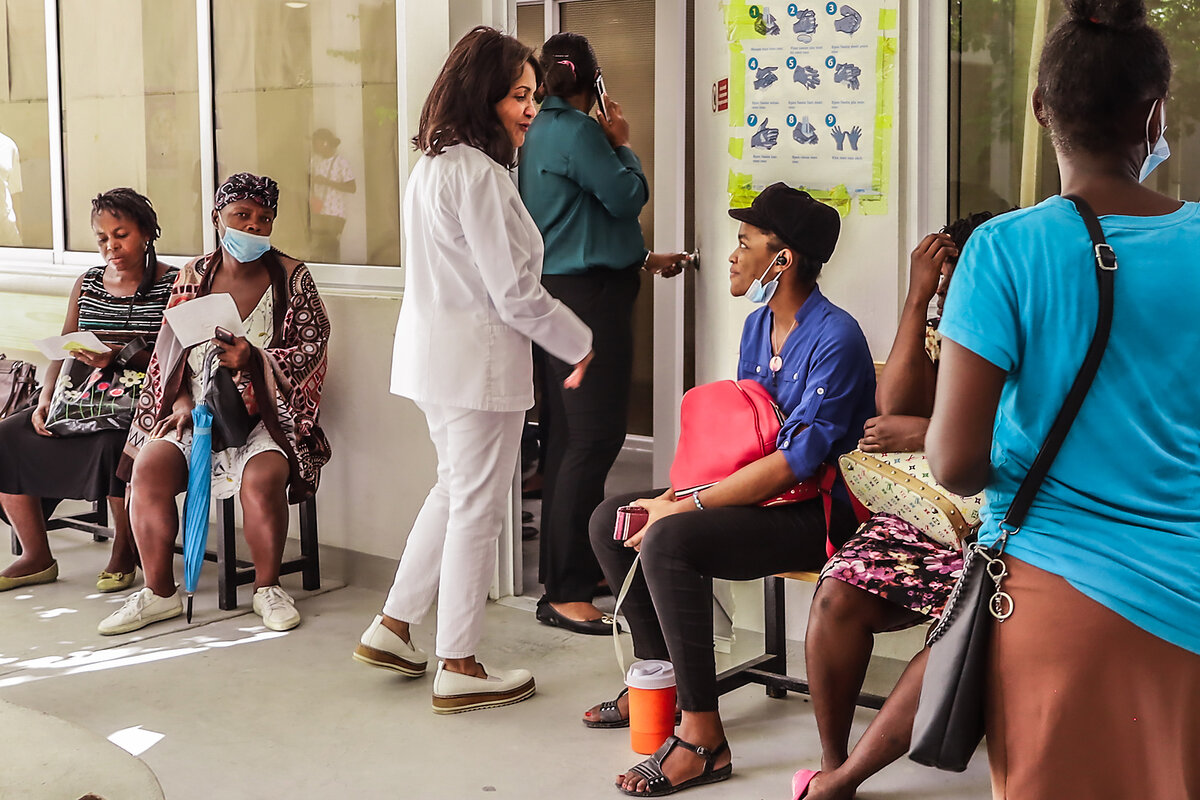Spending taxpayer dollars on foreign wars is a tough sell for most Americans, so ensuring accountability in Ukraine aid matters. Some experts call for more safeguards against corruption.

Why is Christian Science in our name?
Our name is about honesty. The Monitor is owned by The Christian Science Church, and we’ve always been transparent about that.
The Church publishes the Monitor because it sees good journalism as vital to progress in the world. Since 1908, we’ve aimed “to injure no man, but to bless all mankind,” as our founder, Mary Baker Eddy, put it.
Here, you’ll find award-winning journalism not driven by commercial influences – a news organization that takes seriously its mission to uplift the world by seeking solutions and finding reasons for credible hope.
Explore values journalism About usMonitor Daily Podcast
- Follow us:
- Apple Podcasts
- Spotify
- RSS Feed
- Download
Ever heard of “stunt journalism”? Think of a writer who eschews the role of observer in favor of participation. Think of sports writer George Plimpton, who captivated Americans in the 1960s and ’70s by signing up to play pro football (and hockey and baseball) and join the circus.
In today’s Daily, meet A.J. Jacobs, whose desire to plumb originalist interpretations of the U.S. Constitution led him to don attire and write with quill pens the Founding Fathers would recognize. It’s understanding through living the experience – and having some fun, too.
Help fund Monitor journalism for $11/ month
Already a subscriber? Login

Monitor journalism changes lives because we open that too-small box that most people think they live in. We believe news can and should expand a sense of identity and possibility beyond narrow conventional expectations.
Our work isn't possible without your support.
Today's stories
And why we wrote them

( 5 min. read )
Today’s news briefs
• Inflation’s new low: Year-over-year inflation in the U.S. reached its lowest level in more than three years in July. That sets up the Federal Reserve for an interest rate cut in September.
• Olympic boxer: The Paris prosecutor’s office said its unit for combating online hate speech is investigating a complaint made by Algerian Olympic champion Imane Khelif.
• Border agency settles: Lawyers representing nearly 1,100 pregnant employees who worked for U.S. Customs and Border Protection say the agency is paying $45 million to settle a class action discrimination case and has agreed to enact reforms.
• Thai leader ousted: In a 5-4 ruling, the Constitutional Court in Thailand has removed Prime Minister Srettha Thavisin from office over an ethics violation, further shaking up Thai politics after it ordered the dissolution of the main opposition party a week ago.
• Stepping down: Prime Minister Kishida Fumio announced that he will not run in the upcoming party leadership vote. His three-year term expires in September.
• Wyoming reporter resigns: A reporter at a small Wyoming newspaper has left his job after a competitor discovered he was using artificial intelligence to write stories and fabricate quotes, including some by the state’s governor. The Cody Enterprise’s publisher and editor apologized.
( 5 min. read )
Yesterday we shared insights on whether Donald Trump’s proposal for mass deportation of unauthorized immigrants is feasible to implement. Today, a closer look at how deportation works currently.
( 4 min. read )
A generation after the end of Liberia’s civil wars, many victims are still without closure. A new war crimes court could change that.
( 6 min. read )
Can a combination of humor and immersive experiments offer insight into both history and our own times? Author A.J. Jacobs seeks to understand the Supreme Court theory of originalism in “The Year of Living Constitutionally.”
Difference-maker
( 6 min. read )
Haiti is in the midst of escalating political and security crises. But one doctor can’t help but focus on the positive changes she can make for her country.
The Monitor's View
( 2 min. read )
In the last 40 years, more than 70 truth commissions have been established to help restore societies emerging from conflict. Many have offered amnesty to perpetrators of violence if they explain their actions. Yet that pardon often comes with a condition that governments have been reluctant to enforce – a threat to prosecute those who fail to come forward or testify honestly.
The West African country of Liberia now seeks to fix that shortcoming. Two decades after the end of a brutal 14-year period of civil war, the government is working with judges, lawyers, and civil society organizations to establish a special court on economic crimes and human rights violations committed during the conflict.
“For peace and harmony to have a chance to prevail, justice and healing must perfect the groundwork,” President Joseph Boakai said when he signed the order in May creating the new tribunal.
Mr. Boakai’s comment reflects a tension at the core of building peace through reconciliation. Restorative or transitional justice involves weaving individual stories into a larger shared narrative. By bringing perpetrators of violence face-to-face with those who have been harmed, it can tap wells of empathy and forgiveness through deep listening and genuine remorse. It ties justice to individual reformation and redemption.
The hard part is what to do about those who refuse to participate. As the South African Truth and Reconciliation Commission noted in its final report, in order “to avoid a culture of impunity and to entrench the rule of law, the granting of general amnesty in whatever guise should be resisted.” In countries where political leaders have been reluctant to follow truth commissions with prosecutions, victims of war crimes feel doubly harmed.
Following through, on the other hand, accelerates the recovery of democratic principles and the institutions that defend them. In Chile and Argentina, prosecutions that followed truth commissions led to reduced violence, renewed judicial independence, and a restoration of military respect for civilian command, a study by the Chr. Michelsen Institute in Norway found.
Liberia has made solid gains in recovering from a conflict that left an estimated 250,000 dead, displaced more than three times that number, and turned children into soldiers. It elected Africa’s first female president and convened a truth and reconciliation commission. Its economy is growing.
For more than a decade, politicians resisted the truth commission’s recommendation to establish a new court on economic and war crimes. It relied on international courts to convict its most infamous warlords. Meanwhile, corruption and mutual suspicion among political rivals persisted.
The decision to set up the new court, observes Aaron Weah, a Liberian postgraduate student at Ulster University’s Transitional Justice Institute, now sets truth and justice in a new direction. “It is not about retributive versus restorative justice,” he told African Arguments. Liberia may be forging a new model for the rule of law that honors individual dignity over self-interest.
A Christian Science Perspective
Each weekday, the Monitor includes one clearly labeled religious article offering spiritual insight on contemporary issues, including the news. The publication – in its various forms – is produced for anyone who cares about the progress of the human endeavor around the world and seeks news reported with compassion, intelligence, and an essentially constructive lens. For many, that caring has religious roots. For many, it does not. The Monitor has always embraced both audiences. The Monitor is owned by a church – The First Church of Christ, Scientist, in Boston – whose founder was concerned with both the state of the world and the quality of available news.
( 4 min. read )
When we identify all real power as belonging to God, we see more evidence of the reign of good as we engage in local and national political processes.
Viewfinder
A look ahead
We hope you enjoyed today’s Daily. Tomorrow, Fred Weir in Moscow and Ned Temko in London will look at the impact of Ukraine’s incursion into Kursk, Russia, from domestic and international vantage points.








